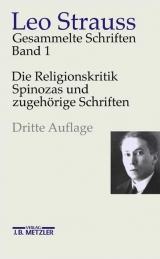The Problem of Knowledge in the Philosophical Doctrine of Friedrich Heinrich Jacobi, Doctoral Dissertation, University of Hamburg, 1921. Reprinted in Gesammelte Schriften, Band 2, Philosophie und Gesetz -- Frühe Schriften, Heinrich Meier, ed., Metzler Verlag, 1997. Abstract reprinted in: Leo Strauss: The Early Writings (1921-1932), Michael Zank, ed., State University of New York Press, 2002.
Excerpt:
Jacobi distinguishes two types of general attitudes of mind, the essential predicates of which are juxtaposed as “courageously believing” [mutig-glaubend] and “timidly doubting” [furchtsam-zweifelnd]. This distinction attains purely theoretical significance by virtue of the fact chat a duality of methods is unequivocally related to the typological duality of attitudes. To be more precise, the method of “universal doubt” corresponds to the second, devalued type of attitude. This method extends far beyond its most famous representative, Descartes. Jacobi tracks it down everywhere: it is by and large the common method of all his opponents. We have sought to characterize as “de- scriptive” the method of the affirmed type, which he himself postulates as the “natural” method.
b) the substance of Jacobi’s doctrines
1. The Doctrine of Knowledge [Erkenntnistehre]
a) The Intellect [Der Verstand]
On the one hand (following Kant), intellect is the absolute principle of knowledge, and, on the other hand, it is the faculty of mere reflection, of concepts, and of proof. In both cases it is purely formal; it claims its “matter” [“Stoff”] from giving faculties, 2 The objects are beyond the sphere of the intellect. The highest and ultimate certainty of consciousness itself, which is unprovable and yet more certain than all proofs, and the material of knowledge [Erkenntnis] that the intellect cannot generate out of itself lead both beyond the sphere of the intellect. Intellectual knowledge [ Verstandeserkenntnis], the proving of things [das Beweisen], continuously refers to [stetes Ver-weisen] something other, and from every other to something other again. It always finds its completion only in what is given by other kinds of knowledge [Erkenntnisarten] . The relative spontaneity of the intellect, which expresses itself in the conceptualization of the given [Verbegriffiichung des Gegebenen], deprives it of knowledge value [Erkenntniswert] in the proper sense, For, according to its essence, knowledge [Erkenntnis] is receptive (as is implied by the very terms Wahrnehmung, and Vrnunft from Vernehmen}? Knowledge [Erkenntnis] is related to something outside of it which provides it with meaning in the first place, and to which it conforms.
Online:
Amazon

